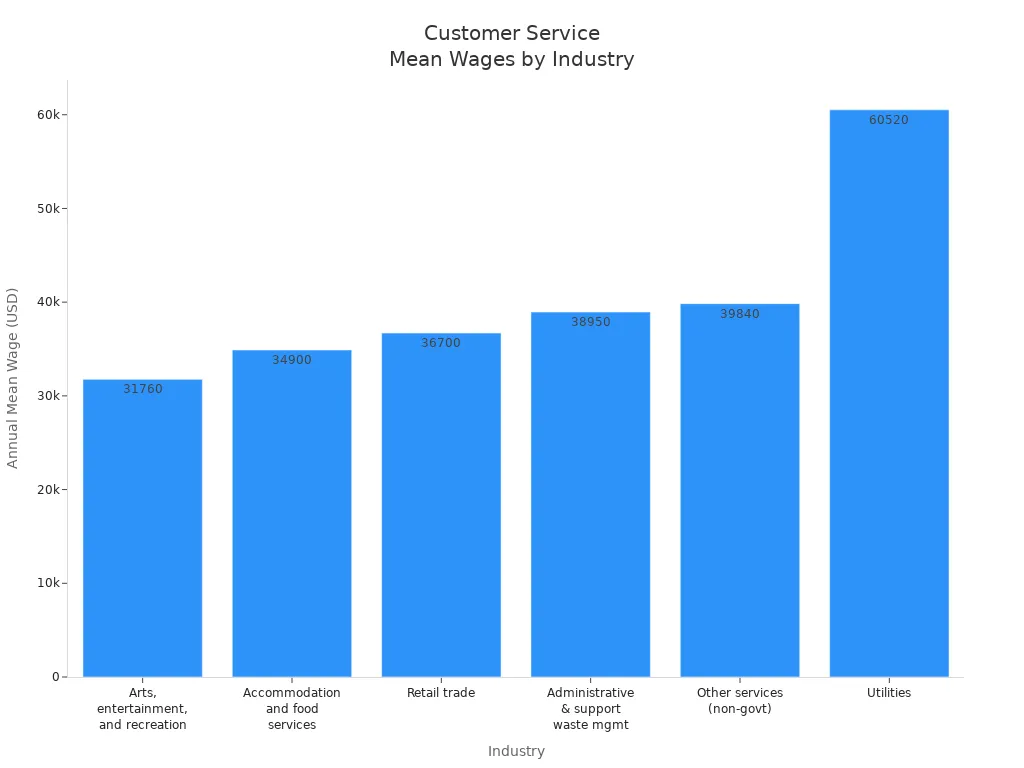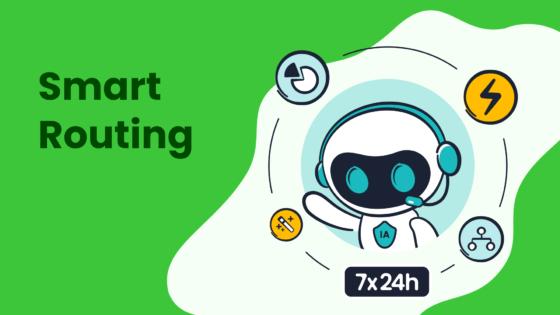SaaS Customer Support Jobs With Great Growth Potential

You can see the demand for SaaS customer support jobs skyrocket in 2025. SaaS companies now view customer support as a value center, not just a cost, which means more roles and better career opportunities for you. The shift to remote customer service jobs has become the norm, with flexible work models fueling a global boom in remote SaaS support positions. Reports show the remote SaaS market hit $17.8 billion in 2024 and keeps growing fast. Sobot leads the way with advanced SaaS support tools like Sobot AI and the Sobot call center, helping customer teams deliver great service from anywhere. If you want a career with real growth and flexibility, these roles offer some of the best opportunities in customer support.
Growth Drivers
SaaS Industry Trends
You see the SaaS world changing fast. New technology shapes how you work and what companies expect from you. Here are some big trends making a difference in saas customer support jobs:
- AI and machine learning now help you solve problems faster. You use chatbots and smart tools to answer questions and help customers any time of day.
- Companies want you to focus on customer experience, not just fixing issues. You help customers learn, give feedback, and stay happy with the product.
- Low-code and no-code platforms let you help customers set up and use software without needing deep tech skills.
- More companies need you to manage many tools at once. You work with APIs and integrations to keep everything running smoothly.
- Mobile-first and industry-specific SaaS tools mean you need to learn new things quickly and help customers in different fields.
Sobot leads in this space by giving you tools like AI-powered chatbots and a unified workspace. These tools make your job easier and help you deliver great customer experience every day.
Demand for Customer Support
SaaS companies now depend on you more than ever. They want you to keep customers happy, help them use products, and make sure they stay loyal. When companies use a subscription model, customer support becomes key for keeping customers and growing revenue. You do more than fix problems. You guide customers, help them get value, and spot ways to upsell or cross-sell.
The global SaaS market keeps growing. Companies like Samsung, OPPO, and Michael Kors trust Sobot to support their customers across the world. As more businesses use SaaS, you see more jobs open up. SaaS companies invest in training and tools so you can handle complex customer needs. You might work in-house or with partners, but your role always matters for customer satisfaction and business growth.
Did you know? Forrester found that companies focused on customer experience grow revenue 41% faster. Good support means customers stay longer and spend more.
Remote Work Expansion
Remote work is now a big part of saas customer support. You can work from anywhere, thanks to cloud tools and strong internet connections. In 2023, SaaS companies in the US hired 2 million people, with many working remote jobs. Tools like Slack and Microsoft Teams help you talk to your team and customers without being in the office.
Cloud platforms like Sobot make remote saas support simple. You get access to customer data, chat, and call features all in one place. This setup helps you balance work and life, and companies can hire talent from anywhere. As more companies move to remote work, you find even more opportunities in remote customer service jobs.
Remote work also means you need to use new tools and learn how to manage your time. Sobot’s omnichannel solution gives you everything you need to help customers, track your work, and keep customer satisfaction high.
Top SaaS Customer Support Jobs

You have more choices than ever when it comes to saas customer support jobs. The industry keeps growing, and companies need people like you to help customers, solve problems, and make sure everyone has a great customer experience. Let’s look at the top roles you can find in this field, what you’ll do in each one, and why these jobs are so important right now.
Here’s a quick look at some of the most in-demand saas customer service roles and what you might do in each one:
| Job Title | Typical Responsibilities |
|---|---|
| Customer Support Representative | First point of contact for customer inquiries, troubleshooting, handling complaints and questions. |
| Technical Support Specialist | Resolves complex software issues, integration, bug-fixing, and provides 1-on-1 technical support. |
| Customer Success Manager | Proactively enhances customer experience, encourages renewals and upsells, monitors customer health. |
| Customer Service Engineer | Provides advanced technical support, on-site repairs/installations, customer training, and service reporting. |
| Account Manager | Manages client portfolios, ensures contract compliance, renewals, and growth opportunities. |
| Support Engineer | Handles complex support issues, collaborates with product teams to develop solutions. |
| Client Relations Manager | Nurtures long-term customer relationships, addresses concerns, ensures satisfaction without direct sales pressure. |
| Service Desk Analyst | First technical support contact, manages queries, routes issues to appropriate channels. |
| Help Desk Technician | Provides immediate assistance for common technical issues via phone or email. |
| Implementation Specialist | Manages software setup and configuration at customer sites, ensuring successful implementation. |
| Technical Account Manager | Combines technical expertise and account management to optimize product use and customer satisfaction. |
| Client Support Analyst | Analyzes customer data to identify trends and improve service quality. |
| Customer Experience Manager | Oversees customer interactions across the journey, develops strategies to enhance satisfaction and loyalty. |
| Onboarding Specialist | Ensures new customers are successfully integrated and understand product features. |
| Escalation Manager | Handles urgent, critical issues, coordinates cross-departmental resolution efforts. |
| Customer Advocacy Manager | Develops programs to turn customers into brand advocates, captures feedback to improve products. |
| Customer Operations Manager | Oversees customer service operations, manages staff and workflows to meet service standards efficiently. |
You can see that these jobs cover everything from answering questions to solving tough technical problems and making sure customers stay happy for the long run. Now, let’s break down the most popular saas customer service roles and what makes each one special.
Customer Support Specialist
You start your journey in saas customer support as a Customer Support Specialist. This role is the backbone of many support teams. You help customers with their questions, fix problems, and make sure they get the most out of the product. You might answer emails, chat messages, or phone calls. You also keep track of every customer interaction in the company’s system.
Here’s what you’ll do as a Customer Support Specialist:
- Respond to customer inquiries through email, chat, phone, or social media.
- Troubleshoot technical issues related to saas products and provide solutions.
- Document every customer interaction and action you take.
- Educate customers about product features and how to use them.
- Collect and share customer feedback with the product team.
- Meet performance goals like response time and customer satisfaction scores.
You need strong problem-solving skills, patience, and a friendly attitude. You also need to learn new software quickly and stay organized. Many companies, like those using Sobot’s Voice/Call Center, give you tools to manage calls, track tickets, and see all customer data in one place. Sobot’s system is easy to use and helps you work faster, so you can focus on helping people instead of fighting with technology.
Tip: If you want to stand out, learn how to use support tools like Sobot’s unified workspace. It lets you handle calls, chats, and tickets all in one spot, making your job much easier.
Technical Support
If you love solving tricky problems, you might enjoy a Technical Support role. Here, you help customers with more complex issues, like software bugs, integration problems, or advanced setup questions. You often work with engineers and product teams to find solutions.
Your main tasks include:
- Troubleshooting software installation, performance, and configuration issues.
- Reproducing customer problems in a test environment to find the root cause.
- Providing real-time support through phone, screen share, or chat.
- Collecting logs and diagnostics to help fix issues.
- Escalating tough problems to the right team.
- Keeping your case queue organized and making sure every ticket gets closed.
You need strong technical skills, attention to detail, and the ability to explain things clearly. In the United States, Technical Support Specialists in saas earn an average base salary of about $64,862 per year, with a range from $50,000 to $69,000 (source). This shows that these jobs pay well and offer room to grow.

Sobot’s Voice/Call Center stands out in this area. Companies like Weee!, Agilent, and Renogy use it because it’s easy to set up, works with other systems, and has a 99.99% uptime. You get features like AI-powered Voicebot, global phone numbers, and encrypted data transfer. These tools help you solve problems faster and keep customers happy.
Note: Sobot’s Voice/Call Center can boost your team’s efficiency by 48% and cut average handle time by 41%. That means you help more customers in less time.
Customer Success Manager
If you want to build long-term relationships and help customers succeed, the Customer Success Manager role could be perfect for you. You don’t just fix problems—you make sure customers get real value from the product and stay loyal.
Here’s what you’ll do as a Customer Success Manager:
- Onboard new customers and help them get started.
- Provide ongoing support and training to make sure they reach their goals.
- Spot upsell and cross-sell opportunities to help the company grow.
- Analyze customer data to find trends and improve the customer experience.
- Work with sales, product, and marketing teams to meet customer needs.
- Manage renewals and keep customers coming back.
- Collect feedback and turn happy customers into brand advocates.
You need great communication skills, empathy, and a knack for solving problems. You also need to understand the product inside and out. Many people start as Customer Success Associates and move up to management as they gain experience. This path is called customer success management, and it’s one of the fastest-growing areas in saas.
Did you know? Customer Success Managers play a big role in keeping customers happy and boosting company revenue. They help reduce churn and increase renewals, which is key for any saas business.
Remote Customer Service Jobs
Remote customer service jobs are more popular than ever. You can work from home, a coffee shop, or anywhere with a good internet connection. Companies love hiring remote workers because they can find the best talent no matter where you live.
In remote saas support, you use cloud-based tools to talk to customers, solve problems, and track your work. Sobot’s omnichannel solution is a great example. It lets you handle calls, chats, emails, and social media messages all in one place. You can see customer history, answer questions, and even use AI chatbots to help with simple requests.
Here’s what makes remote customer service jobs so appealing:
- Flexible work hours and better work-life balance.
- No commute, so you save time and money.
- Access to jobs from companies all over the world.
- The chance to learn new skills and use the latest technology.
You still need to be organized, communicate well, and manage your time. Many saas customer service roles now offer remote options, so you can find the right fit for your lifestyle.
Pro Tip: If you want to land a remote job, show that you can work independently and use digital tools like Sobot’s unified workspace. Companies look for customer service professionals who can stay productive outside the office.
You can see that saas customer support jobs come in many shapes and sizes. Whether you want to answer questions, solve technical problems, build relationships, or work from anywhere, there’s a role for you. Companies like Samsung, OPPO, and Michael Kors trust Sobot’s technology to power their support teams. With tools like Sobot’s Voice/Call Center and omnichannel platform, you can deliver a great customer experience and grow your career in saas customer service roles.
What Makes These Jobs Attractive
Competitive Pay
You want a job that pays well and helps you grow. SaaS customer support roles offer higher salaries than traditional customer service jobs. Companies in the saas industry have strong recurring revenue, so they can give you better pay, bonuses, and even stock options. Take a look at how salaries compare:
| Experience Level | Annual Salary Range (USD) | Example City Midpoint Salaries (USD) |
|---|---|---|
| 2 to 4 years (Product Support Specialist) | $55,000 - $70,000 | San Francisco: $85,000 |
| 5 to 7 years (Senior Product Support Specialist) | $75,000 - $90,000 | New York: $80,000 |
| 8+ years (Lead Product Support Specialist) | $95,000 - $110,000 | Boston: $78,000 |
Compare that to traditional customer service jobs, where entry-level pay often starts around $36,000. SaaS support jobs give you a clear path to higher earnings as you gain experience. You also get perks like health insurance, wellness allowances, and professional development support.

Skill Development
You want to keep learning and growing in your career. SaaS support jobs help you build valuable skills. You learn technical troubleshooting, product knowledge, and communication. Companies offer ongoing training, so you stay up to date with new features and tools. You get to practice real-life scenarios, use screen-sharing, and work with advanced software.
Here’s what you can expect:
- One-on-one training sessions for skill gaps.
- Regular meetings to learn about product updates.
- Peer learning and feedback loops to improve your support style.
- Emotional intelligence training, like active listening and de-escalation.
Sobot’s omnichannel solution makes this easier. You use a unified workspace to access customer data, tickets, and chat history. This helps you solve problems faster and learn from every interaction. You become a key part of the team, and your skills grow with every customer you help.
Flexibility and Remote Options
You want a job that fits your life. SaaS support roles offer unmatched flexibility. You can work remote, choose your hours, and balance work with personal time. Many companies use hybrid teams, with in-house agents during the day and remote teams at night. Outsourcing lets companies scale up during busy seasons without overloading staff.
You get to work from anywhere, whether it’s home, a coffee shop, or another country. Sobot’s omnichannel platform supports remote saas support by giving you access to all channels—phone, chat, email, and social media—in one place. You stay connected, productive, and happy.
Tip: If you value flexibility, look for saas support jobs that use advanced tools like Sobot. You’ll find more remote opportunities and better work-life balance.
You see that saas customer support jobs offer great pay, skill growth, and flexibility. These roles help you build a rewarding career while enjoying the benefits of remote work and continuous learning.
Essential SaaS Support Skills

To succeed in saas customer support, you need a mix of technical and people skills. These skills help you deliver a great customer experience, solve problems quickly, and keep satisfaction high. Let’s break down the most important ones you’ll use every day.
Communication
You talk to customers all day, so clear communication matters most. You need to explain technical things in simple words. Active listening helps you understand what the customer really needs. Personalizing your responses—like using their name or referencing past issues—builds trust. Many saas companies want you to support customers across live chat, email, phone, and social media. Sobot’s unified workspace lets you switch between channels without losing context, so you always give a smooth customer experience. Quick replies and honest updates show a customer-centric mindset and boost satisfaction.
Tip: Use customer data in Sobot to personalize every message. Customers feel valued when you remember their history.
Technical Knowledge
You don’t have to be an engineer, but you should know your product inside out. You’ll answer questions about APIs, integrations, and troubleshooting. Many saas tools update often, so you need to learn fast. Sobot’s training resources help you stay up to date with new features. You can use the platform’s knowledge base to find answers quickly and share them with customers. This makes you a go-to expert and keeps support running smoothly.
Problem-Solving
Every day brings new challenges. You need strong problem-solving abilities to find solutions fast. Sometimes, you fix issues on your own. Other times, you know when to ask for help or escalate. Good problem-solving means you stay calm, think creatively, and never give up until the customer is happy. Sobot’s workspace lets you track tickets, review past cases, and spot patterns. This helps you resolve issues before they grow and keeps customer satisfaction high.
Adaptability
Saas changes fast. New tools, new workflows, and new customer needs pop up all the time. You must adapt quickly and stay positive. Companies look for people who learn new systems fast and handle surprises well. Sobot gives you practice with different support channels and offers feedback to help you grow. When you show adaptability, you become a valuable part of any customer support strategy.
Remember: The best customer service professionals always put the customer first and stay flexible, no matter what comes their way.
How to Land a SaaS Support Job
Looking for SaaS customer support jobs can feel overwhelming, but you can make it easier with the right steps. Many companies now offer remote roles, so you can build your career from anywhere. Here’s how you can stand out and land your dream job.
Job Search Tips
You want to find the best jobs, so start by checking the career pages of top SaaS companies. Sobot, for example, lists open roles on its career page. Sign up for job alerts to stay updated. Use job boards like Indeed, Glassdoor, AngelList, We Work Remotely, and Otta. These sites often feature remote customer support jobs. Join LinkedIn and Slack communities to ask questions and spot hidden opportunities. Tell your friends and network that you’re looking for remote roles—referrals can help you get noticed.
Resume and Profile
Your resume should show why you’re a great fit for SaaS support. Tailor your summary for software environments. Highlight skills like troubleshooting, using call center tools, and handling omnichannel support. Show off your soft skills—empathy, adaptability, and attention to detail matter a lot. Add numbers, like high customer satisfaction scores or fast ticket resolution. Use action verbs and keep your resume clean and easy to read.
Interview Prep
Get ready for questions about real-life situations. You might hear, “Can you share a time you went above and beyond for a customer?” or “How would you handle a tough customer who insists they’re right?” Practice answers that show patience, problem-solving, and product knowledge. Companies may ask if you’ve used their tools, so try out platforms like Sobot’s omnichannel solution before your interview.
Networking
Networking opens doors to jobs you won’t find online. Connect with people on LinkedIn or join industry events. Mentors can guide your career and help you learn about new trends. Stay active in SaaS communities to boost your visibility and learn about remote roles as soon as they open.
Career Growth Paths
You might wonder how far you can go in a saas customer support career. The good news? You have many opportunities to grow, learn, and move up. Let’s look at the main career paths you can follow.
Entry to Senior Roles
You often start as a customer service agent. In this role, you answer questions, gather feedback, and help customers every day. As you gain experience, you can become a specialist who handles more complex issues and works closely with technical teams. With a few years under your belt, you might lead a team or manage projects. Here’s a quick look at how you can move up:
| Career Level | Roles and Responsibilities | Qualifications and Skills Required |
|---|---|---|
| Customer Service Agent | Frontline support, answering questions, gathering feedback, passing technical requests | Good communication, product knowledge, listening skills, level-headedness |
| Customer Service Specialist | Handling complex issues, coordinating with technical teams, assisting agents, understanding customer needs | 2+ years experience, subject matter expertise, communication, collaboration, technical skills |
| Customer Service Lead | Managing team or projects, resolving complex complaints, guiding agents, creating reports | Experience as specialist, people management, communication, collaboration, technical skills |
| Customer Service Manager | Managing operations, hiring/training, quality assurance, planning, strategy execution, KPI management | Experience as lead, strong customer service knowledge, process setup, project oversight |
| VP/Director/Head of Support | Setting vision and strategy, aligning with company goals, budgeting, staffing, policy implementation | Leadership, stakeholder management, problem-solving, operations management |
You can see that each step brings new responsibilities and skills. Many people find that saas support roles open doors to other areas, too.
Moving to Management
If you enjoy leading others, you can move into management. You might start by guiding a small team, then take on bigger projects. Managers plan, train, and make sure the team meets goals. You help set the strategy for customer support and work with other departments. Sobot’s unified workspace makes it easier for managers to track performance and coach agents. You get to shape the customer experience and help your team grow.
Specializing in SaaS
You can also choose to specialize. Some people focus on technical roles, like support engineer or product expert. Others move into customer success, account management, or even product management. The saas industry keeps changing, so new roles appear all the time. For example, Sobot helped OPPO transform its customer service. By using Sobot’s chatbot and ticketing system, OPPO improved efficiency and saw an 83% chatbot resolution rate. Their team handled more requests and boosted customer satisfaction. This real-world story shows how you can make a big impact and find new career growth opportunities in saas.
Tip: Stay curious and keep learning. The more you know, the more career paths you’ll discover in customer support.
You see SaaS customer support jobs growing fast. Companies need you to help every customer feel valued. You learn new skills and use smart tools like Sobot to solve customer problems. Sobot’s platform lets you manage customer chats, calls, and tickets in one place. Many customer teams use Sobot to boost customer satisfaction and save time. If you want a future-proof career, start exploring customer support roles now. Check out Sobot’s solutions and career resources to join the next wave of customer service leaders.
FAQ
What skills do you need for SaaS customer support jobs?
You need strong communication, quick problem-solving, and basic tech skills. Many companies want you to learn new tools fast. Sobot’s training helps you build these skills. Most jobs also look for a friendly attitude and patience with customers.
Can you work remotely in SaaS customer support jobs?
Yes, you can! Many saas customer support jobs offer remote work. Companies like Sobot use cloud-based tools so you can help customers from anywhere. In 2024, over 60% of SaaS support roles allowed remote work, making it easier to balance life and work.
How much can you earn in SaaS customer support jobs?
SaaS customer support jobs pay well. Entry-level roles start around $55,000 per year. Senior roles can reach $110,000 or more. You may also get bonuses and benefits. Sobot’s clients often report higher pay due to the value of skilled support teams.
What makes Sobot a good choice for SaaS customer support jobs?
Sobot gives you advanced tools like AI chatbots, a unified workspace, and a stable call center. You can manage calls, chats, and tickets in one place. This makes your job easier and helps you deliver great service every day.
How do you start a career in SaaS customer support jobs?
Start by learning about SaaS products and practicing your communication skills. Check Sobot’s career page for open roles. Update your resume, join online communities, and apply for entry-level positions. Many people grow fast in this field!
See Also
Enhance SaaS Customer Support Using Effective Live Chat
How AI-Powered Agents Are Transforming Customer Support
Around The Clock Live Chat Drives Business Growth
